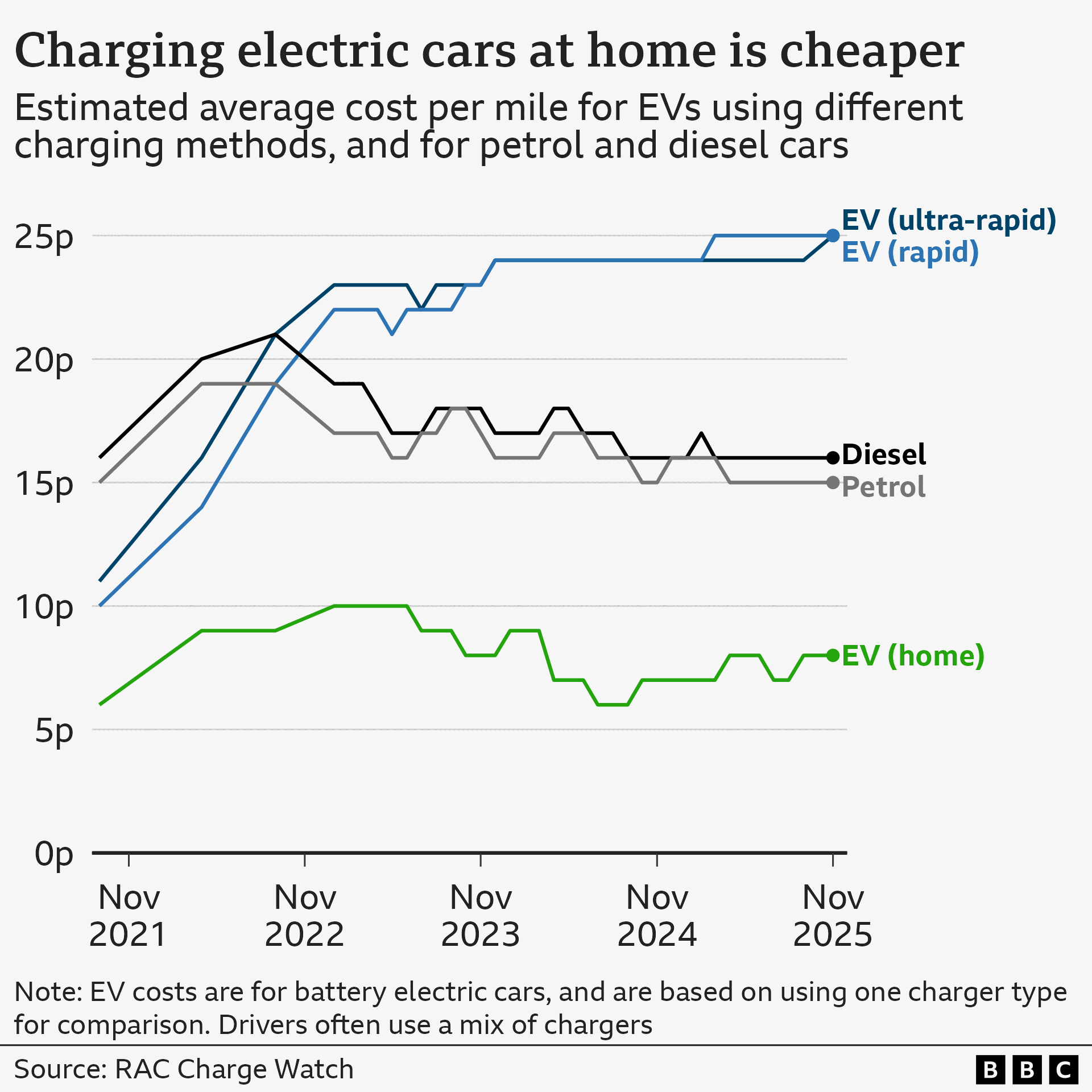What taxes apply to electric vehicles and how could the Budget change that?

- Published
A new tax for drivers of electric vehicles (EVs) could be announced by Chancellor Rachel Reeves in her 26 November Budget.
"Fuel duty covers petrol and diesel, but there's no equivalent for electric vehicles," a government spokesperson told the BBC. "We want a fairer system for all drivers."
All new cars will have to be electric or hybrid from 2030, when a ban on the sale of new petrol and diesel cars comes into force.
Why are new petrol and diesel cars being banned?
The move is part of UK government efforts to meet a legally binding aim of achieving "net zero" by 2050. That means not emitting more greenhouse gases than are removed from the atmosphere.
Domestic transport – including cars, buses and trains - was responsible for more than a quarter of emissions in 2023, making it the largest emitting sector.
Ministers have committed to banning the sale of new petrol and diesel cars in 2030.
That means all new cars will have to be electric, or hybrid - with both an internal combustion engine and electric motor.
UK drivers will be able to buy new hybrids until 2035.
The EU won't ban sales of new fossil fuel-powered cars until 2035.
What taxes apply to electric vehicles?
There is no electric vehicle equivalent of the fuel duty paid by drivers of petrol and diesel cars.
But on 1 April 2025, Vehicle Excise Duty became payable on EVs for the first time.
For new cars, the payment in the first year is £10, rising to the standard rate of £195 in the second year. Those registered between April 2017 and March 2025 pay £195 from the start.
Electric cars registered after that date and costing more than £40,000 are also subject to the "luxury car tax" of £425 per year. This is payable for five years from the second time the vehicle is taxed.
Ahead of the Budget, the Treasury has reportedly been weighing up whether to consult on a "pay-per-mile" tax on EVs from 2028.
The Telegraph reported that EV drivers could be charged 3p per mile, on top of other road taxes, amounting to an extra £12 on a journey from London to Edinburgh.
It is unclear how such a scheme would be enforced, with reports that motorists would pay according to their own estimate of how much they expected to drive.
The AA said the government needed to "tread carefully" to avoid slowing down the transition to EVs. Ford said taxes on electric vehicles may put drivers off buying them at a time when demand has "lost momentum".
In London, drivers of electric vehicles will have to pay the congestion charge from 2026.
How many electric cars are on UK roads?
UK sales of new fully electric cars have been growing steadily.
The number registered rose from 29,800 in October 2024 to 36,800 in October 2025, car industry trade association the SMMT said.
The figure was equivalent to a quarter of new car registrations. The goal is to increase this to 80% by 2030.
The second hand market is also growing, but from a low base. SMMT data shows that about 80,600 used electric cars were purchased between July and September. That's 4% of second hand sales.
Analysis by ZapMap, an electric charger mapper and data provider, suggests that there are now at least 1.7 million fully electric cars on UK roads, about 5 per cent of the total.
Cars with combustion engines still make up the vast majority of cars and people will still be able to drive them after 2035.
How much do electric cars cost to buy and run?
The government recently announced a subsidy scheme for new EVs. Grants are available of up to £3,750 for eligible models priced at £37,000 or below.
It is hoped the scheme will make it easier for people to switch to electric.
The AA said drivers "frequently tell us that the upfront costs of new EVs are a stumbling block to making the switch to electric".
For second hand cars, online marketplace Autotrader says it's "seeing plenty of examples where electric cars are the same price or lower than similar petrol models, specifically in the three to five-year age group".
In addition, about 680,800 electric cars are now being leased, the British Vehicle and Leasing Association (BVRLA) said. That's nearly half of all leases.

When it comes to running costs, electric charging can be cheaper than petrol or diesel. But it depends where you charge.
Charging at home – for those who have the option - is significantly cheaper, especially on an off-peak tariff.
Home charging qualifies for the 5% rate of VAT on domestic energy, compared to the standard rate of 20% for public charging.
Prices can vary a lot when using public charge points, depending on factors including the speed of the charger and the time of day. Certain apps offer discounted charging rates.
The fastest, "Ultra-rapid" charging on the public network may even work out as more expensive per mile than fossil fuels.
Motoring groups say electric cars are generally cheaper to maintain.
Is there enough charging infrastructure?
The range of electric cars has improved, as has the number of public charge points. But concerns remain about having enough of them around the country.
Data from Zapmap shows almost 87,000 across the UK, in about 44,000 locations. Those include places like supermarket car parks and lamppost chargers.
In March, a report by the Public Accounts Committee of MPs said availability on motorways was still "patchy", external.
It said the government was on track to reach the minimum 300,000 points needed by 2030. However, it added that "too few have been installed outside of the South East and London, which currently host 43% of all charge points".
The report also raised "concerns around the impact on drivers with disabilities, those without access to off street parking and disadvantaged groups".